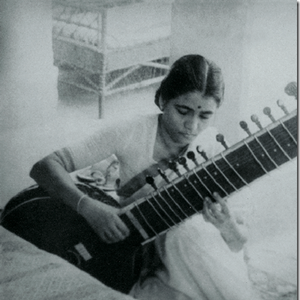
| Trackimage | Playbut | Trackname | Playbut | Trackname |
|---|---|---|---|---|
| 30952474 | Play | Raga Kaushiki | 00:30 Tools | |
| 30952472 | Play | Raga Manj Khamaj | 18:01 Tools | |
| 69718385 | Play | Raga Manjh Khamaj | 18:00 Tools | |
| 69718387 | Play | Raga Kaunsi Kanada | 06:31 Tools | |
| 30952476 | Play | Khambavathi | 06:31 Tools | |
| 69718386 | Play | Malkauns | 06:31 Tools | |
| 69718388 | Play | Kaushi Kanada | 06:31 Tools | |
| 69718389 | Play | Yaman Kalyan | 06:31 Tools |

-
- 1,353
- plays
-
- 296
- listners
-
- 1353
- top track count
Annapurna Devi (Devanāgarī:अन्नपूर्णा देवी) (born Roshanara Khan, Maihar, India, 1926) is a reclusive Surbahar (bass Sitar) maestro of Indian Classical Music. Family and early life Annapurna Devi represents a family of great tradition of Indian classical music. Her father and guru Ustad Alauddin Khan, founder of the "Senia Maihar Gharana" or "Senia Maihar School" of Indian classical music, was considered a singular phenomenon in the twentieth century Indian classical music. Her uncles Fakir Aftabuddin Khan and Ustad Ayet Ali Khan were revered musicians at their native place Shibpur in Bangladesh. Her brother Ustad Ali Akbar Khan is considered by many as one of the greatest Sarod maestros. Her former husband Sitarist Pandit Ravi Shankar is perhaps the most well-known Indian classical musician abroad. Annapurna Devi was born in 1926 at Maihar, a small princely state of British India, (now a part of Madhya Pradesh state of India) , where her revered father Ustad Alauddin Khan was a royal court musician at that time. But, her family has their ancestry in the village of Shibpur in the then British India, present Bangladesh. Annapurna Devi grew up in Maihar as Roshanara Khan. She was one of the daughters (Jahanara, Sharija, Roshanara) of Ustad Alauddin Khan. Sharija died an early death suffering from diseases in her childhood. When Alauddin's other daughter, Jahanara, got married, and a jealous mother-in-law burnt her Tanpura, Alauddin Khan decided not to train his other daughters. One day, however, he came home to discover Annapurna teaching her brother Ali Akbar Khan, and her talent made the emotional father change his mind. Annapurna, since then, started learning classical vocal music, Sitar, and Surbahar from her father. Early career Annapurna Devi became a very accomplished Surbahar player of the Maihar Gharana (school) within a few years of starting to take music lessons from her father, and started guiding many of his father's disciples , Pandit Nikhil Banerjee and Ustad Bahadur Khan) in classical music as well as in the techniques and intricacies of Sitar playing. Meanwhile, Ustad Alauddin Khan's Sitar student Ravi Shankar fell in love with Annapurna and sought permission from Alauddin to marry his daughter. The marriage between Ravi Shankar and Annapurna Devi took place when Ravi was 21 years, and Annapurna was only 14 years old. On marriage, she converted to Hinduism and received the name Annapurna (originally the name of a Hindu goddess) from the Maharaja of Maihar. The marriage lasted some twenty years (though not always happily), and she gave birth to a son, Shubhendra Shankar (1942–1992), whom Annapurna Devi trained in Sitar. There are no recordings out commercially of this artist. Teaching Notable mentions among her students would be her nephew Sarode maestro Ustad Aashish Khan; renowned flautists Hariprasad Chaurasia and Nityanand Haldipur; Sitarists Chandrakant Sardeshmukh, Sudhir Phadke, and Rooshikumar Pandya; and Sarodists Pradeep Barot, and Basant Kabra.Occasionally in the early seventies she taught the late sarod player Vasant Rai's wife kokila Rai the Surbahar. All of them carry on the legacies of Annapurna Devi's, and thus Ustad Alauddin Khan's, music through their recitals. She is also the key figure of Acharya Alauddin Music Circle (an association in the memory of Alauddin Khan for promoting Indian classical music), in Mumbai. Honours Though she did not take music as her profession, she received utmost reverence in all circles of Indian classical music especially for her unending repertoire in Indian classical music, and her traditional "dhrupadi" approach to music. She has received some of the most distinguished musical and civilian honours of India. She is the recipient of, among many, the Padma Bhushan (India's third highest civilian honour) in 1977; and the Sangeet Natak Akademi Award (the highest Indian honour in performing arts) in 1991; and the Deshikottam which is an honorary doctorate degree by Nobel laureate poet Rabindranath Tagore's Visva-Bharati University in 1999. She has not recorded any music albums. But some of her performances (notably, 1. Raga Kaushi Kanara and Raga Majh Khamaj, Surbahar recital; and 2. Raga Yaman duet Surbahar recital with Pandit Ravi Shankar) that have been secretly taped from her earlier (1950s) concerts, are non-commercially available among a percentage of music lovers in India. In spite of her avoidance of media-limelight, she continues to be thought of as a classical instrumentalist of the highest calibre in India. Read more on Last.fm. User-contributed text is available under the Creative Commons By-SA License; additional terms may apply.